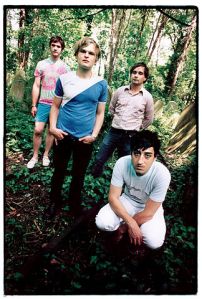
Here’s a photo of our box TV … I mean my brothers at Christmas a few years ago. The thing really did take over everything, even pictures!
The 1980s, though remembered for many glorious fashion trends, television shows and slang terms. These things, though memorable, are the good things. This is when my parents were in high school. Often they’ll talk about how horrible the ‘70s were, and how glorious the ‘80s were in comparison. As much as they acknowledge, looking back, that they had their iffy moments as well, they enjoyed it, to say the least.
Their attachment to the 80s was seen in my home, growing up. My parents were married in 1988, so our family was technically started in this decade. And when I say growing up, I don’t mean these trends stuck around until I was 9 or 10. I mean they have stayed, until as recently as this past summer. We had a box television set that sat in our family room for my entire life that was used as our primary TV. We still get the daily paper (which, of course, I appreciate, but is something that has gone by the wayside for others) and clip physical coupons. My dad kept his analog cell phone until the cell phone company told him that they were taking down the cell phone towers that allowed him to get service on his phone, forcing him to upgrade to a flip phone.
As humorous as all of this sounds, every single non-technological thing about my family has taught me something, and they are all things that I wouldn’t have had the opportunity to learn had my parents been different about technology.
1.) Social media – I think I was 13 when I first asked my dad if I could get AIM. He didn’t get why I would want to sit at our computer and chat online with my friends (using our DSL and phone lie) when I could just call them up. When social media took off further than that and I asked my parents if I could have a MySpace, my dad didn’t get why I needed it. He would not understand Facebook or Twitter if he got an account, and to this day doesn’t understand the point. “Why would I need to create an account to give all of my information away online?” he asks me when he sees me scrolling through my phone. “Why would I want to make it easier for people to find me at all times of the day or night?” I get where he is coming from, but as a girl who loves her social media, I don’t even really attempt to explain its importance to him. But what I have learned from my dad’s questions and curiosities about it is that sometimes, it would be great to be so anonymous. It would be great, too, to not have the feeling of entrapment by social media, feel that nagging need to see what’s going on in the world. SO to an extent, I do get it, and I commend him for being so okay with not being so easily found.
2.) The importance of physical paper – As is seen by my love and attention to newspapers, I have a real appreciation for reading things in their physical form. I don’t have an eReader, and until recently didn’t have a tablet, so I read physical books, newspapers and magazines. I think this is something I would have lost my love for if it weren’t so common in my household, and I’ve learned I like all of these mediums the way that they are. Unlike on an eReader of tablet, when reading a book, that’s all that’s going on. Screens make leaving the book and looking for something else to do very common and possible, whereas a book in physical form can draw you in.
3.) Not being too attached to technology – When I am at my house, I try not to be on my cell phone all the time, and that’s because it just isn’t the way my family is. I am the only one out of six that has a smart phone, so staying off the technology for other members of my family is a little easier than it is for me, but I try to put it away. When we sit on the couch in the family room and talk, that’s all we are doing, sitting and talking. No technology distracts them, so I try not to let it distract me. It’s hard, but worth it, as I learn to live in the moment because of them.
4.) Nothing beats in person interaction – All of these things really do just come down to living in the present, and just enjoying each other’s company. Looking at tablets, phones and laptops, there are a ton of ways to not interact in person, and my family has continuously and endlessly emphasized making this a priority.
5.) Being frugal can be a very good thing – When I was young, I would get annoyed with the fact that I didn’t have the social media that others did, or that I didn’t have the latest and greatest technology. However, looking back, because of this, I was taught to be pretty frugal at a young age. I learned how to save money and how to focus on what’s important. As much as I wanted the newest cell phone or tablet, I knew that if I really wanted it, I would have to save up for it. I learned this young and now it is engrained in me. I think because of this I have made more responsible monetary decisions.
So, as much as sometimes I complain and feel behind in the world, there are true positives to not focusing all of my time and energy on technology. I find myself thankful for my family and the fact that they force me to slow down and appreciate all that is around me.










